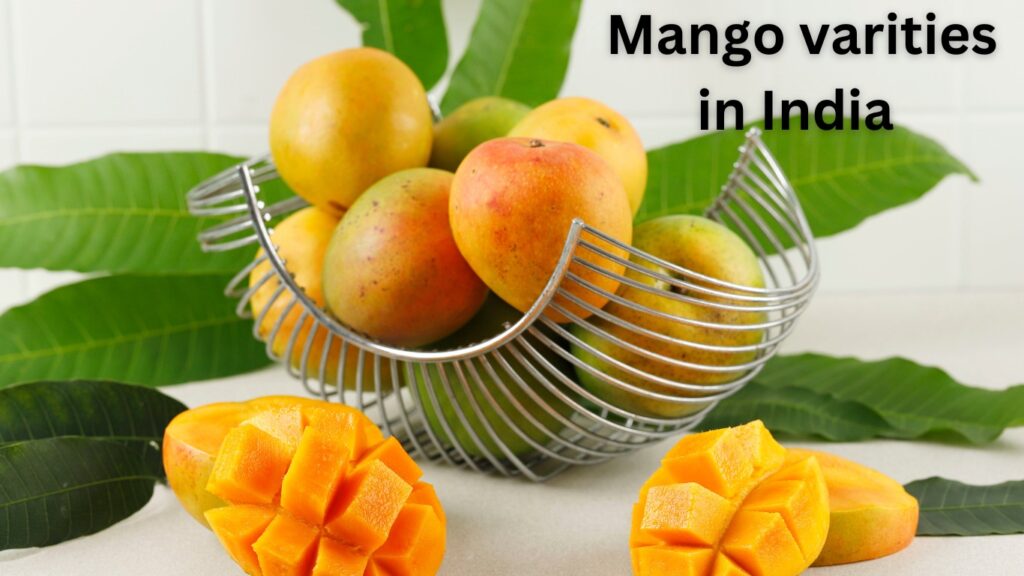Mango varities in India : a timeless summer tradition is renowned for its diverse and delectable varieties of mangoes, often referred to as the “king of fruits.” Each variety has its unique taste, aroma, and texture, making mangoes a much-loved fruit across the country and the world. Here are some of the most popular mango varieties in India:

- Alphonso (Hapus) Mango varities in India
Alphonso, often hailed as the finest variety, originates from Ratnagiri and Sindhudurg districts of Maharashtra. Known for its rich, creamy texture and distinct sweet flavor, Alphonso is also characterized by its vibrant saffron-colored flesh. This variety is highly sought after both in India and internationally. - Dasheri Mango varities in India
Hailing from the Northern state of Uttar Pradesh, Dasheri mangoes are long, oval, and greenish-yellow in color. They are cherished for their aromatic and sweet flesh, making them a popular choice for mango lovers. - Kesar Mango varities in India
Grown primarily in the Gujarat region, Kesar mangoes are known for their bright orange pulp and intense sweetness. This variety is often used in making mango pulp and juices due to its rich flavor and texture. - Langra Mango varities in India
Langra mangoes come from Varanasi in Uttar Pradesh and are distinct with their green skin even when ripe. They are medium-sized, with a unique sweet and slightly tangy flavor, making them a favorite in North India. - Himsagar Mango varities in India
Originating from West Bengal, Himsagar mangoes are medium-sized with a thin skin and a unique, sweet aroma. The flesh is fibrous-free, which adds to the enjoyment of eating them. - Banganapalli (Safeda) Mango varities in India
This variety from Andhra Pradesh is known for its large size and firm, fiberless flesh. Banganapalli mangoes have a sweet taste with a subtle hint of sourness and are often used in making pickles and canned mango slices. - Neelam Mango varities in India
Neelam mangoes are primarily grown in the Southern states of Andhra Pradesh, Tamil Nadu, and Karnataka. They are small to medium-sized, with a vibrant yellow skin and sweet, fragrant flesh. Neelam mangoes are typically available later in the mango season. - Totapuri Mango varities in India
Distinctive for its parrot beak shape, Totapuri mangoes are grown in Karnataka, Andhra Pradesh, and Tamil Nadu. They have a unique tart taste and are often used in salads, pickles, and for making mango pulp. - Chaunsa Mango varities in India
Originating from Uttar Pradesh, Chaunsa mangoes are known for their exceptionally sweet and juicy flesh. They are medium to large in size and are one of the most popular varieties in India. - Amrapali Mango varities in India
A hybrid variety developed in India, Amrapali is a cross between Dasheri and Neelum. It has a small to medium size with a red-orange blush and is known for its delicious, sweet, and juicy flesh.
Mango varities in India : Mango Seasons in India
Mangoes are a summer fruit, and their season varies across different regions in India. Generally, the mango season begins in March and lasts until July, but this can vary depending on the specific variety and geographical location.
March to April: Early varieties like Alphonso and Banganapalli start appearing in the markets. Mango varities in India.
May to June: This is the peak season for mangoes with most varieties, including Dasheri, Kesar, Langra, Himsagar, and Chaunsa, becoming widely available. Mango varities in India.
July: Late varieties like Neelam are harvested, and the season gradually comes to an end.
Mango varities in India : Health Benefits of Mango
Mangoes are not just delicious; they are also packed with numerous health benefits:
- Rich in Nutrients
Mangoes are a rich source of vitamins and minerals, including Vitamin C, Vitamin A, Vitamin E, and Vitamin K. They also provide essential nutrients like potassium, magnesium, and dietary fiber. - Boosts Immunity
The high Vitamin C content in mangoes helps boost the immune system, promoting overall health and aiding in the prevention of common illnesses like colds and flu. - Promotes Digestive Health
Mangoes contain enzymes like amylases, which aid in the breakdown and digestion of carbohydrates. The fiber content in mangoes also helps in maintaining digestive health by preventing constipation and promoting regular bowel movements. - Supports Eye Health
Mangoes are rich in Vitamin A and beta-carotene, which are crucial for maintaining good vision and preventing night blindness and dry eyes. - Antioxidant Properties
Mangoes contain antioxidants such as quercetin, astragalin, and gallic acid, which help protect the body against harmful free radicals and reduce the risk of chronic diseases like cancer and heart disease. - Promotes Skin Health
The high Vitamin C and Vitamin A content in mangoes contribute to healthy skin by promoting collagen production and reducing signs of aging, such as wrinkles and fine lines. - Aids in Weight Management
Mangoes are low in calories and high in dietary fiber, which helps in feeling full for longer periods, aiding in weight management and reducing overeating. - Improves Heart Health
The potassium and magnesium content in mangoes helps regulate blood pressure, while the antioxidants and fiber content contribute to overall cardiovascular health by reducing bad cholesterol levels.
Mango varities in India : Tips to Avoid Side Effects of Mangoes
While mangoes are generally safe and beneficial to eat, consuming them in excess or in certain ways can lead to side effects. Here are some tips to avoid potential side effects:
- Moderation is Key
Mangoes are high in natural sugars and calories, so it’s important to consume them in moderation, especially for individuals with diabetes or those watching their calorie intake. - Avoid Unripe Mangoes
Unripe mangoes can cause digestive issues such as stomach pain, indigestion, and throat irritation. It is advisable to consume fully ripened mangoes. - Mind Allergies
Some individuals may be allergic to mangoes, particularly to the sap or skin of the fruit. It is important to wash the fruit thoroughly and peel it before consuming it to avoid allergic reactions. - Stay Hydrated
Mangoes are considered a “heating” fruit in Ayurveda, which means they can increase the body’s heat. To balance this effect, drink plenty of water or consume other cooling foods like yogurt or cucumber. - Proper Storage Store mangoes properly to avoid spoilage. Ripe mangoes should be kept in the refrigerator to extend their shelf life, while unripe mangoes should be stored at room temperature until they ripen.
- Avoid Excessive Consumption Eating too many mangoes can lead to gastrointestinal issues like diarrhea due to their high fiber content. It’s best to limit consumption to one or two mangoes per day.
- Wash Thoroughly Always wash mangoes thoroughly before eating to remove any pesticides or chemicals that might be on the skin.
- Pair with Other Foods Pairing mangoes with other foods like yogurt or having them as part of a balanced meal can help in better digestion and absorption of nutrients.
Conclusion : Mango varities in India : a timeless summer tradition, Mangoes are a delightful and nutritious fruit that holds a special place in the hearts of many, especially in India. With a variety of types to choose from, each offering its unique taste and health benefits, mangoes are a versatile addition to any diet. However, it’s important to consume them in moderation and follow the tips mentioned above to avoid any potential side effects. Enjoy mangoes as part of a balanced diet to reap their numerous health benefits and indulge in their delicious taste.
What is the best season to buy mangoes in India?
The best season to buy mangoes in India is from March to July, with the peak season typically occurring in May and June.
Which is the most popular mango variety in India?
Alphonso (Hapus) is often considered the most popular and sought-after mango variety in India, renowned for its rich flavor and creamy texture.
Are mangoes beneficial for health?
Yes, mangoes are highly nutritious, rich in vitamins (such as Vitamin C and A), minerals, antioxidants, and dietary fiber, which contribute to various health benefits including improved immunity, digestion, and skin health.
Can diabetics eat mangoes?
Diabetics can eat mangoes in moderation, considering their high natural sugar content. It’s important to monitor blood sugar levels and consult with a healthcare professional.
Are there any side effects of eating mangoes?
Eating too many mangoes can cause digestive issues such as diarrhea due to their high fiber content. Additionally, unripe mangoes can cause stomach discomfort and throat irritation.
What are some tips to avoid the side effects of mangoes?
Consume mangoes in moderation, avoid unripe mangoes, wash them thoroughly before eating, stay hydrated, and pair them with other foods to aid digestion.
Can mangoes cause allergic reactions?
Yes, some people may be allergic to mangoes, particularly to the sap or skin. It’s advisable to wash and peel mangoes before consuming them to reduce the risk of allergic reactions.
Which mango variety is best for making pickles?
Totapuri mangoes are commonly used for making pickles due to their tart taste and firm flesh.
Which state in India produces the most mangoes?
Uttar Pradesh is one of the largest mango-producing states in India, known for varieties like Dasheri and Langra. Other major mango-producing states include Maharashtra (Alphonso) and Gujarat (Kesar).




